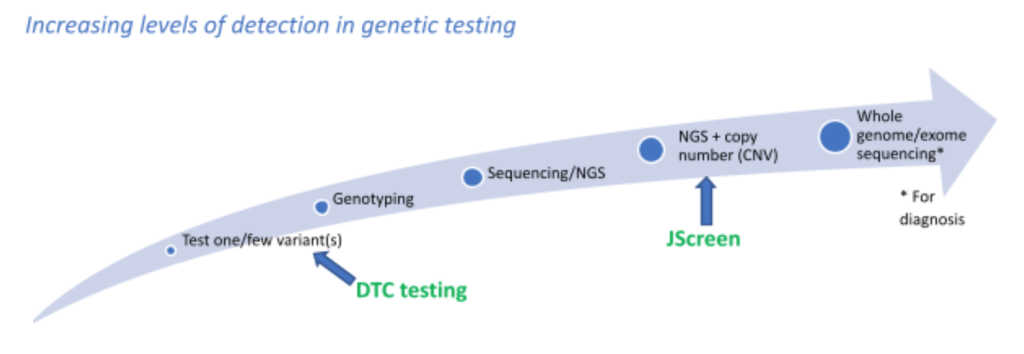What’s the Difference Between Ancestry DNA Testing and Carrier Screening?

“I don’t need any more genetic testing – I had that one ancestry test and I’m pretty sure they tested me for everything I need.”
Unfortunately, it’s very possible that the ancestry test didn’t include as much testing as you might have thought. There are major differences between the various types of genetic tests a person may get. Here are some key things to know:
1. There are many ways to test a person’s DNA.
Direct-to-consumer (DTC) testing companies, like ancestry.com and 23andMe, are not required to meet the higher standards and certifications that clinical laboratories must meet. JScreen, as well as doctor’s offices, do testing through clinical laboratories, so they provide a validated, trustworthy result.
But, even within clinical testing, there can be stark differences in the capabilities of various tests that may be ordered. You may wish to speak to a genetic counselor to help you determine whether the test you’re getting is of clinical quality, comprehensive (covering a number of different genes), with a high capability of picking up a genetic mutation (if one is present) and a low rate of false positives or false negatives.

2. Any test result from a DTC company should be confirmed through a clinical lab.
Before your doctor changes anything about your medical management based on the genetic test result you receive from a DTC company, it’s very important that they confirm the information is actually correct. Unfortunately, there are scary and sad cases of people who have had irreversible surgeries and expensive procedures that were not necessary, because they were based on false positive results from a DTC company.
3. There are different reasons why a person may want genetic testing.
As a result, there are different tests that are the right choice for different people.
Here are some common options:
a. Planning a family:
If you want to know your chance of having a child with a genetic condition, you probably want reproductive carrier screening through a clinical lab (JScreen, or your doctor’s office). Ideally, you would test prior to getting pregnant and using a comprehensive panel including up to hundreds of conditions. DTC companies often test a small number of genes with lower detection rates, so they are typically not the ideal choice for this type of testing.
b. Interest in cancer risk: If you want to know the chance that you may develop cancer in the future, you probably want cancer genetic screening through a clinical lab. Again, a comprehensive panel is often ideal. Keep in mind, though, that genetic testing only looks for the inherited risks for cancer – everyone also has a general population risk, since most cancers happen sporadically. So, regardless of your genetic test results, you should still do cancer screening (mammograms, prostate exams, etc) recommended by your doctor.
c. Curiosity: Maybe you want to know more about your ancestry, or what your genetic make-up says about how you process certain foods (like cilantro or asparagus). DTC testing may be the right choice for you.
d. You have symptoms: If you want help diagnosing a condition, you likely need a visit with a specialist (such as a geneticist). They can assess your symptoms and help in your diagnosis, and a genetic counselor can review appropriate specialized genetic testing options with you.
4. There are people to help you find the right test.
Genetic counselors have specialized training in both genetics and counseling. So, they’re very good at listening and will help a person who may want or need genetic testing choose the best test option. Look for companies that employ genetic counselors and make use of them as an incredible resource!
JScreen’s mission is to make high-quality, comprehensive genetic testing available in a patient-friendly way. Our reproductive carrier screening test uses next-generation sequencing (NGS) and copy number analysis (CNV), and the panel covers over 220 conditions. Detection rates for almost every gene on our panel exceed 99%. Our cancer screening test also uses NGS + CNV and covers 63 genes associated with increased risk for many different cancer types. We also have a robust staff of genetic counselors to ensure that each patient gets personalized service and the opportunity for in-depth review of their results with a genetics professional.
